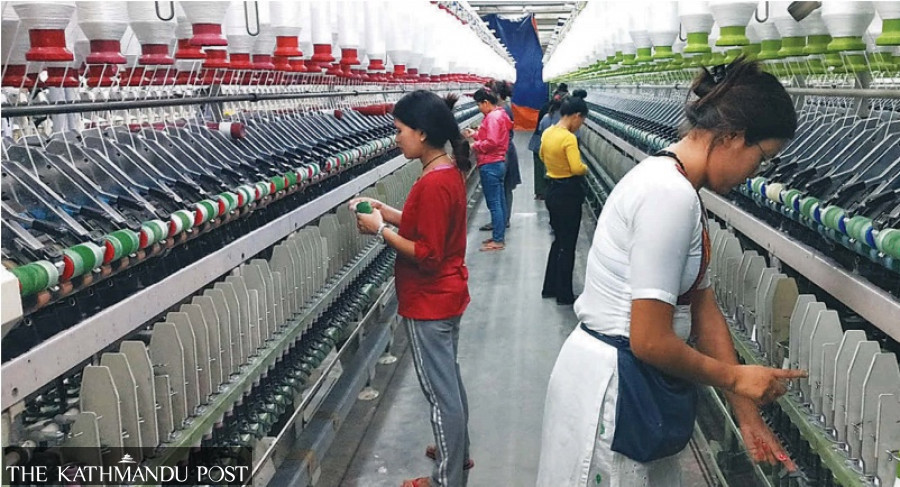Money
Nepal’s industrial capacity utilisation hampered by Covid-19, report says
The country’s industrial sector continues to face uncertainty due to raw material and manpower shortages during the pandemic.
Krishana Prasain
Nepal saw a marginal increase in industrial capacity utilisation in the last fiscal year 2020-21 on a year-on-year basis as the impact of the Covid-19 continued to hinder the industry utilisation, a report of the central bank showed.
According to the Economic Activities Report (Integrated) 2020-21 report released by Nepal Rastra Bank on Sunday, the average capacity utilisation of industry during the survey conducted in the last fiscal year stood at 52.2 percent compared to 48.4 percent in the previous fiscal year 2019-20.
“There has been no significant improvement in industrial capacity utilisation in the last fiscal year even though the impact of Covid-19 on (industrial operation) was minimised,” the report states.
Unlike the first lockdown in early 2020, the government imposed a relatively less strict lockdown during the second wave of pandemic in early 2021 allowing industries to operate by following health protocols strictly.
But, the country’s industrial sector continued to face uncertainties due to raw material and manpower shortages during the pandemic.
“The economic activities in the market didn’t pick up yet because it was difficult to get raw materials easily due to problems in the global supply chain. So, factories could not operate at their full capacity,” said Dinesh Shrestha, vice president (industry) at Federation of Nepalese Chambers of Commerce and Industry (FNCCI), the apex private sector body.
The price of raw material has also increased due to high global demand and surge in shipping cost contributing to the limited industrial capacity utilisation, he said.
Of the industries included in the study, the capacity utilisation of vegetable ghee, mustard oil, soybean oil, processed milk, rice, wheat flour, chocolate, noodle, processed tea, synthetic textile, jute goods, garment, processed leather, paper, rosin, bricks, JI wire, tyre and tube declined, according to the report.
The industrial capacity utilisation of industries like animal feed, biscuit, sugar, ostrich meat, alcoholic drinks, soft beverage, cigarette, thread, pashmina, readymade garment, paints, medicine, soap and plastic goods increased during the latest survey. The industry capacity of cement, concrete, iron and steel, utensils, aluminium, electric wire and cable wire and footwear also increased.
“It will be challenging for the domestic industry to keep a balance between demand and supply due to a possible third wave of Covid-19,” the report said.
The emergence of a new variant of the coronavirus has cast a pall over Nepal’s manufacturing and business sectors as it threatens to put the brakes on the country’s slowly recovering economy.
The country’s business activities, except the tourism industry, are on track to recover with 87.2 percent of businesses and industries resuming full operation as of October.
Nepal’s business community is worried that the new variant could compel the government to impose lockdowns as a quick measure to contain possible transmission.
According to the report, the industry sector is facing challenges like ensuring the availability of skilled manpower by stopping Indian semi-skilled and skilled manpower from leaving the country. The facilitation in the establishment of industry and reducing the cost of establishment, strengthening the relationship between industry entrepreneurs and labourers and creating a sound industrial environment are other challenges.
Similarly, effective management and expansion of special economic zones, enhancing the competitiveness of industries and development and expansion of industrial infrastructure continue to be challenging, the report said.
As per the report, attracting investment in the setting up of manufacturing industries, increasing production and consumption of domestic industrial raw materials, making industrial supply chain effective, creating an investment-friendly environment and attracting foreign direct investment in profitable and competitive export-oriented industries exist in the industrial sector are existing challenges in the country.
A total of 8,453 industries have been registered in the last fiscal year compared to 8,250 industries in the fiscal year 2020-21, the report showed. Of the total registered industry, 1,214 were large scale, 1,908 medium and 5,331 small scale industries. They created 628,712 jobs.
As per the report, a total of 183 foreign investments were approved with a commitment of investment of Rs32.20 billion creating 5,697 employment.
The total loan amount that industry sectors borrowed from banking and financial institutions increased by 20.9 percent to Rs130.67 billion till the mid-July of last year compared to the same time in the previous year. Of the total loan, 33.3 percent went to the non-food producing industry, 29.1 percent to construction-related industry 15.2 percent to electric, gas and water-related industry, 17.2 to agriculture, forest and beverage industry.
According to the report, 54 cement companies took loans of Rs75.43 billion in the fiscal year 2021-22 from the banking sector. The cement industry in the last fiscal year produced 10.35 million tonnes of cement which is 67 percent of the total installed capacity.
The Sher Bahadur Deuba administration has been functioning without a minister of industry even though nearly six months have passed since it was sworn in. Keeping the Ministry of Industry, Commerce and Supplies without a head for nearly half a year exhibits the government's lack of concern when the economy requires particular attention amid the coronavirus disaster.
“With one of the key ministries in the government, the Ministry of Industry, Commerce and Supplies, stumbling along without a helmsman for such a long time, the country is facing stagnation in the industrial sector,” insiders said.




 9.15°C Kathmandu
9.15°C Kathmandu














